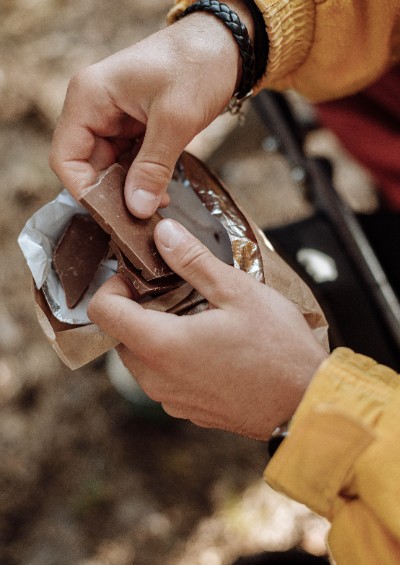Friday 16th June 2023, 1:18pm
Mountain Safety Advisor, Ben Gibson, shares some thoughts on nutrition for a day in the hills

A day out in the mountains gives many of us a good (and mostly guilt free!) reason to enjoy eating lots. But are you eating the best food for keeping your energy levels constant and preventing that dreaded fatigued feeling?
Typically, you will use between 1500-2500 calories just for normal day-to-day life, although this can change greatly depending on your lifestyle and how active you are. The more energetic you are, the more calories you will burn, which means youíll need to eat more regularly to sustain energy levels for a day out on the hills.
But eating for long-term energy is not as simple as just stuffing your face to replace calories. The body can burn through both fats and carbohydrates to replenish its energy but, the energy released from these fuel sources is very different.
Fat for fuel
In the basic sense, fat reserves are good to have as an energy source for the body to function but it takes the body longer to break them down (compared to carbohydrates) and to be utilised effectively. There is a lot of research, especially within the Ultra Running community, regarding High Fat-Low Carb diets for long distance events.
Carbohydrates for fuel
Carbohydrates (stored as glycogen in the liver and muscles) are quicker burning and give more instant energy, for those high output activities. However, carbohydrate reserves are small and may only last for around two hours of hard exercise. This is where fatigue and that feeling of complete exhaustion (known in the running/cycling communities as Ďbonkingí) can set in if you donít do anything about refuelling.
Benís all-day energy eating plan
Below is a plan that I use for keeping on top of energy levels during a mountain day. This is very much a guideline, which can be modified in lots of ways to suit you as the individual. The most important thing is to find out what works for you and eat foods that you want to eat, rather than eating for the sake of getting the energy that the body requires.
The night beforeÖ
I like to stock up on carbohydrates the night before a big hill day. Healthy portions of pasta or rice, fish and chips, pizza, sweet potato, to name a few. Keep the fuel tank full!
The morning ofÖ
Personally, I find a cooked breakfast too much! It feels greasy and heavy, which sits in the stomach for a long time. But if this works for you, then go for it! Muesli, porridge, granola, toast, nuts and fruit are a good option. Good quality, slow-release carbohydrates are a good source of healthy energy.
Hydration is important for helping your muscles and also for your brain (especially in the hotter days) where, mental exhaustion is brought on by dehydration and therefore has the potential for the brain to tire and make mistakes, such as, slips trips or falls and navigations errors!
Along with your morning hot beverage of tea or coffee, it is also good to get at least a pint of water in as well. The last time you may have hydrated yourself might have been 8-10 hours ago!
Also, having water in the car and sipping it to top-up the tank on your way to the hills never goes amiss. I do this to carry a smaller amount of water on the hill as I donít generally drink a lot on a hill day but, everyone is different. I think we often start the day already dehydrated but arenít necessarily aware of it! Thatís why having plenty of liquids with breakfast and travelling to your starting point for the day sets you up better for the day ahead.
During the day
You donít want to weigh yourself down with a rucksack over filled with food but want to carry enough to get you through the day. Itís also a good idea to have that little bit extra just in case it takes longer to get off the mountains or there is an emergency!
Little and often is a good mantra to have. Stopping for a lunch spot is great on a nice day, which allows good rest and fantastic views but, think twice doing this on a cloudy, wet, windy day or in winter! The body cools down very quickly when stopped for a long period and takes longer to get back into a comfortable temperature and walking rhythm.
Of course, the other very important element to the above is Hydration! It is much harder to recover from dehydration than feeling hungry.
Energy gels can be useful for a quick fix of energy but, theyíre not for everyone! Effectively they are pure carbohydrate with lots of maltodextrin, which can give the gut some serious problemsÖleaving you potentially caught short and no toilet! However, there are lots of brands that boast all-natural ingredients, with a wide range of flavours. Experiment if you feel curious enough!
Chilling at home
An important aspect that can be overlooked is recovery food. Replenishing lost proteins, carbohydrates and salts are important to feeling less stiff and helping sore muscles recover. So, itís always a good idea to have a good hearty dinner.
Hopefully, this is a starting point for you to think what foods to take on the hills and how to manage your energy levels on a big day out.
Donít be afraid to experiment and try different things that will work best for you.
Eat, drinkÖand be adventurous!